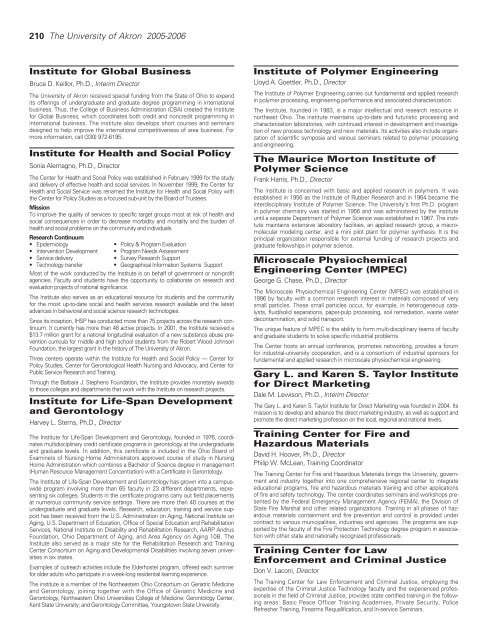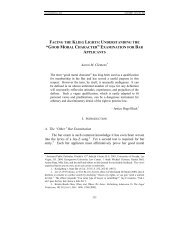Calendar 2005-2006 - The University of Akron
Calendar 2005-2006 - The University of Akron
Calendar 2005-2006 - The University of Akron
You also want an ePaper? Increase the reach of your titles
YUMPU automatically turns print PDFs into web optimized ePapers that Google loves.
210 <strong>The</strong> <strong>University</strong> <strong>of</strong> <strong>Akron</strong> <strong>2005</strong>-<strong>2006</strong><br />
Institute for Global Business<br />
Bruce D. Keillor, Ph.D., Interim Director<br />
<strong>The</strong> <strong>University</strong> <strong>of</strong> <strong>Akron</strong> received special funding from the State <strong>of</strong> Ohio to expand<br />
its <strong>of</strong>ferings <strong>of</strong> undergraduate and graduate degree programming in international<br />
business. Thus, the College <strong>of</strong> Business Administration (CBA) created the Institute<br />
for Global Business, which coordinates both credit and noncredit programming in<br />
international business. <strong>The</strong> institute also develops short courses and seminars<br />
designed to help improve the international competitiveness <strong>of</strong> area business. For<br />
more information, call (330) 972-6195.<br />
Institute for Health and Social Policy<br />
Sonia Alemagno, Ph.D., Director<br />
<strong>The</strong> Center for Health and Social Policy was established in February 1999 for the study<br />
and delivery <strong>of</strong> effective health and social services. In November 1999, the Center for<br />
Health and Social Service was renamed the Institute for Health and Social Policy with<br />
the Center for Policy Studies as a focused sub-unit by the Board <strong>of</strong> Trustees.<br />
Mission<br />
To improve the quality <strong>of</strong> services to specific target groups most at risk <strong>of</strong> health and<br />
social consequences in order to decrease morbidity and mortality and the burden <strong>of</strong><br />
health and social problems on the community and individuals.<br />
Research Continuum<br />
• Epidemiology • Policy & Program Evaluation<br />
• Intervention Development • Program Needs Assessment<br />
• Service delivery • Survey Research Support<br />
• Technology transfer • Geographical Information Systems Support<br />
Most <strong>of</strong> the work conducted by the Institute is on behalf <strong>of</strong> government or non-pr<strong>of</strong>it<br />
agencies. Faculty and students have the opportunity to collaborate on research and<br />
evaluation projects <strong>of</strong> national significance.<br />
<strong>The</strong> Institute also serves as an educational resource for students and the community<br />
for the most up-to-date social and health services research available and the latest<br />
advances in behavioral and social science research technologies.<br />
Since its inception, IHSP has conducted more than 75 projects across the research continuum.<br />
It currently has more than 48 active projects. In 2001, the Institute received a<br />
$13.7 million grant for a national longitudinal evaluation <strong>of</strong> a new substance abuse prevention<br />
curricula for middle and high school students from the Robert Wood Johnson<br />
Foundation, the largest grant in the history <strong>of</strong> <strong>The</strong> <strong>University</strong> <strong>of</strong> <strong>Akron</strong>.<br />
Three centers operate within the Institute for Health and Social Policy — Center for<br />
Policy Studies, Center for Gerontological Health Nursing and Advocacy, and Center for<br />
Public Service Research and Training.<br />
Through the Barbara J. Stephens Foundation, the Institute provides monetary awards<br />
to those colleges and departments that work with the Institute on research projects.<br />
Institute for Life-Span Development<br />
and Gerontology<br />
Harvey L. Sterns, Ph.D., Director<br />
<strong>The</strong> Institute for Life-Span Development and Gerontology, founded in 1976, coordinates<br />
multidisciplinary credit certificate programs in gerontology at the undergraduate<br />
and graduate levels. In addition, this certificate is included in the Ohio Board <strong>of</strong><br />
Examiners <strong>of</strong> Nursing Home Administrators approved course <strong>of</strong> study in Nursing<br />
Home Administration which combines a Bachelor <strong>of</strong> Science degree in management<br />
(Human Resource Management Concentration) with a Certificate in Gerontology.<br />
<strong>The</strong> Institute <strong>of</strong> Life-Span Development and Gerontology has grown into a campuswide<br />
program involving more than 65 faculty in 23 different departments, representing<br />
six colleges. Students in the certificate programs carry out field placements<br />
at numerous community service settings. <strong>The</strong>re are more than 40 courses at the<br />
undergraduate and graduate levels. Research, education, training and service support<br />
has been received from the U.S. Administration on Aging, National Institute on<br />
Aging, U.S. Department <strong>of</strong> Education, Office <strong>of</strong> Special Education and Rehabilitation<br />
Services, National Institute on Disability and Rehabilitation Research, AARP Andrus<br />
Foundation, Ohio Department <strong>of</strong> Aging, and Area Agency on Aging 10B. <strong>The</strong><br />
Institute also served as a major site for the Rehabilitation Research and Training<br />
Center Consortium on Aging and Developmental Disabilities involving seven universities<br />
in six states.<br />
Examples <strong>of</strong> outreach activities include the Elderhostel program, <strong>of</strong>fered each summer<br />
for older adults who participate in a week-long residential learning experience.<br />
<strong>The</strong> institute is a member <strong>of</strong> the Northeastern Ohio Consortium on Geriatric Medicine<br />
and Gerontology, joining together with the Office <strong>of</strong> Geriatric Medicine and<br />
Gerontology, Northeastern Ohio Universities College <strong>of</strong> Medicine; Gerontology Center,<br />
Kent State <strong>University</strong>; and Gerontology Committee, Youngstown State <strong>University</strong>.<br />
Institute <strong>of</strong> Polymer Engineering<br />
Lloyd A. Goettler, Ph.D., Director<br />
<strong>The</strong> Institute <strong>of</strong> Polymer Engineering carries out fundamental and applied research<br />
in polymer processing, engineering performance and associated characterization.<br />
<strong>The</strong> Institute, founded in 1983, is a major intellectual and research resource in<br />
northeast Ohio. <strong>The</strong> institute maintains up-to-date and futuristic processing and<br />
characterization laboratories, with continued interest in development and investigation<br />
<strong>of</strong> new process technology and new materials. Its activities also include organization<br />
<strong>of</strong> scientific symposia and various seminars related to polymer processing<br />
and engineering.<br />
<strong>The</strong> Maurice Morton Institute <strong>of</strong><br />
Polymer Science<br />
Frank Harris, Ph.D., Director<br />
<strong>The</strong> institute is concerned with basic and applied research in polymers. It was<br />
established in 1956 as the Institute <strong>of</strong> Rubber Research and in 1964 became the<br />
interdisciplinary Institute <strong>of</strong> Polymer Science. <strong>The</strong> <strong>University</strong>’s first Ph.D. program<br />
in polymer chemistry was started in 1956 and was administered by the institute<br />
until a separate Department <strong>of</strong> Polymer Science was established in 1967. <strong>The</strong> institute<br />
maintains extensive laboratory facilities, an applied research group, a macromolecular<br />
modeling center, and a mini pilot plant for polymer synthesis. It is the<br />
principal organization responsible for external funding <strong>of</strong> research projects and<br />
graduate fellowships in polymer science.<br />
Microscale Physiochemical<br />
Engineering Center (MPEC)<br />
George G. Chase, Ph.D., Director<br />
<strong>The</strong> Microscale Physiochemical Engineering Center (MPEC) was established in<br />
1996 by faculty with a common research interest in materials composed <strong>of</strong> very<br />
small particles. <strong>The</strong>se small particles occur, for example, in heterogeneous catalysts,<br />
fluid/solid separations, paper-pulp processing, soil remediation, waste water<br />
decontamination, and solid transport.<br />
<strong>The</strong> unique feature <strong>of</strong> MPEC is the ability to form multi-disciplinary teams <strong>of</strong> faculty<br />
and graduate students to solve specific industrial problems.<br />
<strong>The</strong> Center hosts an annual conference, promotes networking, provides a forum<br />
for industrial-university cooperation, and is a consortium <strong>of</strong> industrial sponsors for<br />
fundamental and applied research in microscale physiochemical engineering.<br />
Gary L. and Karen S. Taylor Institute<br />
for Direct Marketing<br />
Dale M. Lewison, Ph.D., Interim Director<br />
<strong>The</strong> Gary L. and Karen S. Taylor Institute for Direct Marketing was founded in 2004. Its<br />
mission is to develop and advance the direct marketing industry, as well as support and<br />
promote the direct marketing pr<strong>of</strong>ession on the local, regional and national levels.<br />
Training Center for Fire and<br />
Hazardous Materials<br />
David H. Hoover, Ph.D., Director<br />
Philip W. McLean, Training Coordinator<br />
<strong>The</strong> Training Center for Fire and Hazardous Materials brings the <strong>University</strong>, government<br />
and industry together into one comprehensive regional center to integrate<br />
educational programs, fire and hazardous materials training and other applications<br />
<strong>of</strong> fire and safety technology. <strong>The</strong> center coordinates seminars and workshops presented<br />
by the Federal Emergency Management Agency (FEMA), the Division <strong>of</strong><br />
State Fire Marshal and other related organizations. Training in all phases <strong>of</strong> hazardous<br />
materials containment and fire prevention and control is provided under<br />
contract to various municipalities, industries and agencies. <strong>The</strong> programs are supported<br />
by the faculty <strong>of</strong> the Fire Protection Technology degree program in association<br />
with other state and nationally recognized pr<strong>of</strong>essionals.<br />
Training Center for Law<br />
Enforcement and Criminal Justice<br />
Don V. Laconi, Director<br />
<strong>The</strong> Training Center for Law Enforcement and Criminal Justice, employing the<br />
expertise <strong>of</strong> the Criminal Justice Technology faculty and the experienced pr<strong>of</strong>essionals<br />
in the field <strong>of</strong> Criminal Justice, provides state certified training in the following<br />
areas: Basic Peace Officer Training Academies, Private Security, Police<br />
Refresher Training, Firearms Requalification, and In-service Seminars.

















